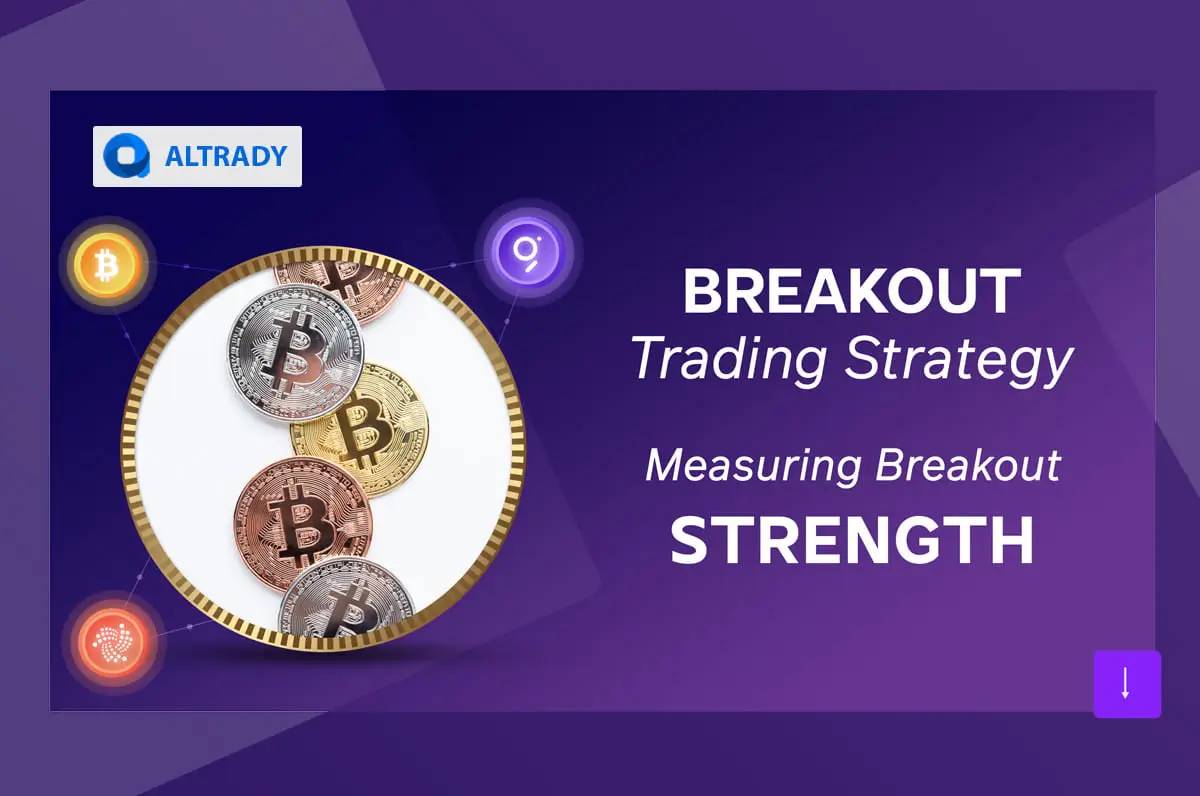Black Friday is loading…
Get 40% off with Altrady’s yearly plan and take the lead.
.svg)
.svg)
.svg)
.svg)
.svg)
.svg)
.svg)
.svg)
.svg)
.svg)
.svg)
.svg)
.svg)

Breakout trading strategies are a method highly effective for crypto trading due to their ease of application. However, it can be tricky for traders to read the right signals as this strategy can be susceptible to false movements and volatility. Overcoming false signals is possible with the right setups of tools and concepts aligned with the basis of the breakout trading strategy.

Through the following sections we will try to comprehend how breakouts work, pointing out some advantages and disadvantages, and we will give demonstrations of how using price action, technical indicators, and timeframes could help traders measure breakout strength.
A price breakout is a sign of a potential trend shift or continuation in the up or down direction of a crypto asset. This type of movement in the market is based on the surpassing of relevant price levels like support and resistance.
During a trend when the price reaches a resistance or support zone, breakout traders could expect some possible scenarios:
Generally, chart patterns like head and shoulders and ascending or descending triangles are analyzed by breakout traders when they are detecting an opportunity. These patterns are common in uptrends and downtrends.
Another market condition where breakouts take place is during ranging markets. A range is a type of market season that accumulates some liquidity around repeated resistance and support formations that the price reaches several times until it breaks out from it.

Breakout strategies are attractive for their simplicity and effectiveness, helping traders approach markets in an easy way. However, breakouts come with some pitfalls like false breakouts, which are very common along with abundant misleading signals.

Despite the pitfalls, this is a good strategy for all types of traders at any level. As a concept, breakouts could serve as a viewpoint for a broader analysis of the market sentiment when they occur in very relevant zones.
When traders master breakouts and properly measure them to avoid misleading signals, they for sure will carry with them an effective receipt to take advantage of fast price movements when a price level is broken.

Measuring breakouts will require some advanced techniques for the proper recognition of the best setups and candlestick patterns while reading indicators or conducting different time frame analyses.

Price action concepts and technical indicators like volume or RSI might play a substantial role in confirming a breakout signal.
The analysis of price action will measure the decisiveness of the breakout. For example:
Analyzing different time frames will measure the weight of a breakout for the overall market trend. For example:

Breakout with Volume
Indicator |
Measurement |
|---|---|
Relative Strength Index (RSI) |
The RSI line can form triangle patterns and The RSI, in combination with price action, |
Volume for confirmation |
An increase in volume during a breakout |
Other important factors to consider when measuring breakouts are:
Scenario |
Price Action |
Indicator |
Timeframe |
|---|---|---|---|
A bullish breakout |
Decisive upward
|
The breakout is
|
The breakout occurs
|
Measuring breakouts is essential for the success of this strategy. Breakouts can be a simple approach to the markets, but it is that simplicity that makes this trading method a target of misleading signals.
Breakout traders can still reach high effectiveness on their strategy when taking into consideration multiple confluences of factors for the breakout analysis like different timeframes, candle sizes and patterns, or indicators like Relative Strength Index and Volume.
In the ultimate instance, breakouts will give insights into market sentiment. You can give this strategy a try by signing up for a free trial on Altrady and start paper trading Breakouts in crypto markets along with a wide range of technical indicators.